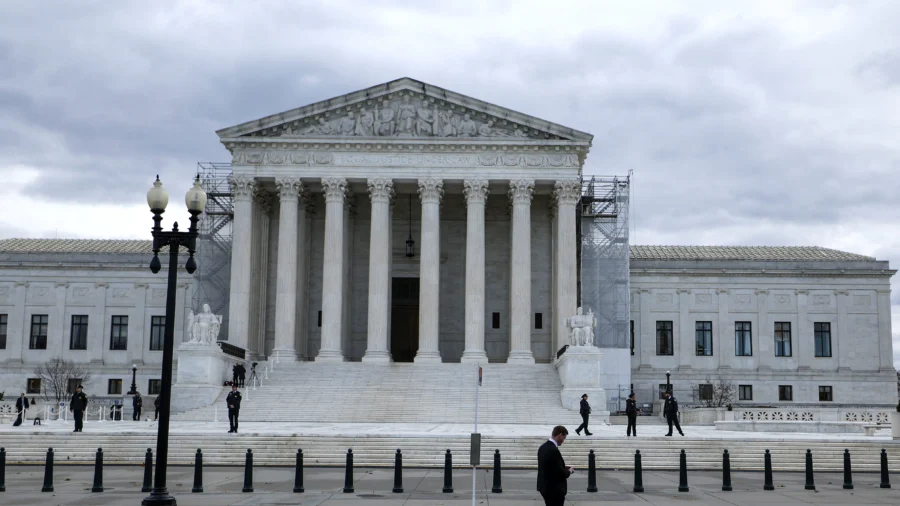The Supreme Court won’t consider whether an Indiana middle school was required to let a transgender girl use the boys’ bathroom.
The ruling comes after the U.S. Court of Appeals for the 7th Circuit affirmed a lower court’s injunction last year that allowed transgender students to use bathrooms that corresponded to their claimed gender identity.
The decision not to get involved in the case means that pending lawsuits will continue across the United States, with judges potentially arriving at differing conclusions.
The Biden administration holds that Title IX of the Education Amendments Act of 1972, a federal law that prohibits sex-based discrimination in education, protects transgender students from discrimination related to their purported gender identity.
The directive has been challenged in lawsuits related to school sports and bathroom access. The Biden administration backtracked somewhat last year, unveiling a new proposed rule that would permit some sex-based restrictions in high school and college sports.
The Supreme Court denied the petition for certiorari, or review, in Metropolitan School District of Martinsville v. A.C., in an unsigned order on Jan. 16. No justices dissented. The court did not explain its decision. At least four of the nine justices must vote to grant a petition for a case to move forward to the oral argument stage.
A.C., who was born female but now identifies as male, has since graduated from John R. Wooden Middle School in Martinsville, Indiana, and is now in high school. A lower court noted that A.C. began identifying as a male at 8 years of age, used masculine pronouns, started sporting a masculine haircut and wore masculine clothing.
A lack of linguistic clarity has clouded the issue in recent years as the concepts of sex and sexual identity, or gender—a politically and scientifically contentious idea whose definition isn’t universally agreed upon—have become difficult to separate. Despite the distinct meanings of the two words, many institutions and individuals use “gender” to mean biological sex, including on fillable forms and documents.
The school district had urged the Supreme Court to grant its request to accept the case so the court could resolve a “square and entrenched” split among federal courts of appeal, according to its petition.
“Over the past several years, schools across the country have confronted a difficult decision on which local mores and opinions vary widely: whether to determine access to traditionally sex-segregated spaces such as bathrooms and locker rooms based on biological sex or on how students identify,” the document reads. “The federal courts have proven as divided as local school boards. Some, like the Seventh Circuit in the decision below, have concluded that Title IX and the Equal Protection Clause [of the U.S. Constitution] dictate a single nationwide answer to this question and preclude local jurisdictions from maintaining traditional policies determining access based on biological sex.
“Others have concluded that local school boards retain substantial discretion to fashion policies that respond to local preferences, including, for example, adopting different policies for elementary and secondary schools.”
The 11th Circuit determined that neither Title XI nor the Equal Protection Clause prevents schools from maintaining separate bathrooms for the two sexes.
But the 4th and 7th Circuits held the opposite, finding that both Title XI and the Equal Protection Clause preclude schools from refusing students access to bathrooms corresponding to their gender identity, the petition said.
A.C. argued in a brief filed in December 2023 that the case was moot because she graduated from the middle school and no longer “has any prospective interest in that school’s policy, and this Court lacks jurisdiction to review it.”
A.C. also argued it would be “premature to grant review without further percolation in the lower courts because a critical regulation is under revision.
“With respect to Title IX, the only disagreement in the circuits concerns the meaning of a soon-to-be-amended Department of Education regulation that allows schools to provide ‘separate toilet … facilities on the basis of sex.”
Other Transgender Cases
The Supreme Court has issued several rulings in transgender cases in recent years.
The court held 6–3 in 2020 that employees can’t be fired from their jobs because of sexual orientation or gender identity.
The landmark ruling in Bostock v. Clayton County brought an expanded meaning to the phrase “on the basis of sex” that appears in the nondiscrimination provisions of the Civil Rights Act of 1964.
The Supreme Court has sidestepped other cases involving transgender young people.
In the case of Gloucester County School Board v. Grimm in 2021, the court refused a Virginia case about requiring students to use the bathroom that corresponds to their sex after a lower court determined the policy was unconstitutional.
The student, Gavin Grimm, was born female but began identifying as male. She has since graduated from high school and is now an activist in California.
From The Epoch Times


